| Listing 1 - 10 of 10 |
Sort by
|
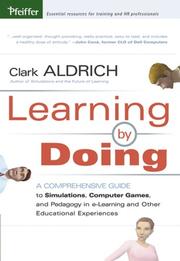
ISBN: 0787977357 9780787977351 Year: 2005 Publisher: San Francisco Pfeiffer
Abstract | Keywords | Export | Availability | Bookmark
 Loading...
Loading...Choose an application
- Reference Manager
- EndNote
- RefWorks (Direct export to RefWorks)
371.694 --- Geprogrammeerde instructie. CAI. Leermachines. Computerbegeleid onderwijs. --- Computer games. --- Computer-assisted instruction. --- Education --- Simulation methods. --- 371.694 Geprogrammeerde instructie. CAI. Leermachines. Computerbegeleid onderwijs. --- Computer-assisted instruction --- Computer games --- Application software --- Electronic games --- CAI (Computer-assisted instruction) --- Computer-aided instruction --- Computer-assisted learning --- Computer based instruction --- Computer-enhanced learning --- Electronic data processing in programmed instruction --- ILSs (Integrated learning systems) --- Integrated learning systems --- Microcomputer-aided instruction --- Microcomputer-assisted instruction --- Microcomputer-assisted learning --- Microcomputer-based instruction --- Teaching --- Educational technology --- Programmed instruction --- Telematics --- Simulation methods --- Geprogrammeerde instructie. CAI. Leermachines. Computerbegeleid onderwijs --- Data processing --- Internet games --- Television games --- Videogames --- Games
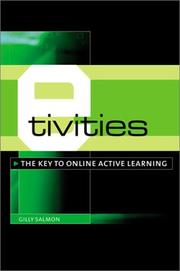
ISBN: 0749436867 9780749436865 Year: 2005 Publisher: Oxon RoutledgeFalmer
Abstract | Keywords | Export | Availability | Bookmark
 Loading...
Loading...Choose an application
- Reference Manager
- EndNote
- RefWorks (Direct export to RefWorks)
e-learning --- Lerarenopleiding : CVO --- E-learning --- online leren --- 371.39 --- Computer assisted instruction --- Higher education --- Computer-assisted instruction --- Distance education --- Computer-assisted instruction. --- Distance education. --- Teaching --- Afstandsonderwijs. --- Computergestuurd onderwijs. --- E-learning. --- Instructie via computers. --- Computer network resources. --- 371.300 --- Distance learning --- Education --- Open learning --- Telecommunication in education --- CAI (Computer-assisted instruction) --- Computer-aided instruction --- Computer-assisted learning --- Computer based instruction --- Computer-enhanced learning --- Electronic data processing in programmed instruction --- ILSs (Integrated learning systems) --- Integrated learning systems --- Microcomputer-aided instruction --- Microcomputer-assisted instruction --- Microcomputer-assisted learning --- Microcomputer-based instruction --- Educational technology --- Programmed instruction --- Telematics --- Computer network resources --- Data processing
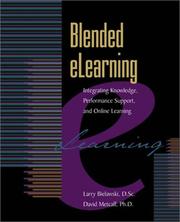
ISBN: 1599966646 1423716442 9781423716440 0874257174 9780874257175 Year: 2005 Publisher: Amherst, Mass. : HRD Press,
Abstract | Keywords | Export | Availability | Bookmark
 Loading...
Loading...Choose an application
- Reference Manager
- EndNote
- RefWorks (Direct export to RefWorks)
Computer-assisted instruction. --- Internet in education. --- Distance education. --- Employees --- Employee development --- Employee training --- Employees, Training of --- In-service training --- Inservice training --- On-the-job training --- Training of employees --- Training within industry --- Vestibule schools --- Occupational training --- Employer-supported education --- Distance learning --- Education --- Open learning --- Telecommunication in education --- Internet (Computer network) in education --- CAI (Computer-assisted instruction) --- Computer-aided instruction --- Computer-assisted learning --- Computer based instruction --- Computer-enhanced learning --- Electronic data processing in programmed instruction --- ILSs (Integrated learning systems) --- Integrated learning systems --- Microcomputer-aided instruction --- Microcomputer-assisted instruction --- Microcomputer-assisted learning --- Microcomputer-based instruction --- Teaching --- Educational technology --- Programmed instruction --- Telematics --- Training of. --- Data processing
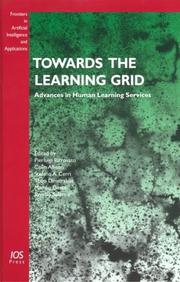
ISBN: 6610504881 1280504889 9786610504886 1429402466 1607501236 600000592X 1601291043 9781429402460 1586035347 Year: 2005 Publisher: Washington, DC IOS Press
Abstract | Keywords | Export | Availability | Bookmark
 Loading...
Loading...Choose an application
- Reference Manager
- EndNote
- RefWorks (Direct export to RefWorks)
There is a paradigm shift in Informatics in general and in technologies enhancing human learning in particular. Divided into four parts, this book is dedicated to Position papers: visions about what to do and why to do it in the next years. It offers partial answers to ""how"" to do it and it is concerned with the directions in learning services.
Computer-assisted instruction --- Educational technology --- Internet in education --- Web-based instruction --- Online instruction, Web-based --- Online teaching --- Web-based online instruction --- Internet (Computer network) in education --- Education --- Instructional technology --- Technology in education --- Technology --- Educational innovations --- Instructional systems --- Teaching --- CAI (Computer-assisted instruction) --- Computer-aided instruction --- Computer-assisted learning --- Computer based instruction --- Computer-enhanced learning --- Electronic data processing in programmed instruction --- ILSs (Integrated learning systems) --- Integrated learning systems --- Microcomputer-aided instruction --- Microcomputer-assisted instruction --- Microcomputer-assisted learning --- Microcomputer-based instruction --- Programmed instruction --- Telematics --- Aids and devices --- Data processing --- Courses, Online --- Online courses --- Online education --- Distance education
Periodical
Abstract | Keywords | Export | Availability | Bookmark
 Loading...
Loading...Choose an application
- Reference Manager
- EndNote
- RefWorks (Direct export to RefWorks)
Mapping the relationships between technology, knowledge and society₂in theory, research, application and social practice.
Information technology --- Knowledge management --- Computer-assisted instruction --- Technologie de l'information --- Gestion des connaissances --- Enseignement assisté par ordinateur --- Computer-assisted instruction. --- Information technology. --- Knowledge management. --- Management of knowledge assets --- Management --- Intellectual capital --- Organizational learning --- IT (Information technology) --- Technology --- Telematics --- Information superhighway --- CAI (Computer-assisted instruction) --- Computer-aided instruction --- Computer-assisted learning --- Computer based instruction --- Computer-enhanced learning --- Electronic data processing in programmed instruction --- ILSs (Integrated learning systems) --- Integrated learning systems --- Microcomputer-aided instruction --- Microcomputer-assisted instruction --- Microcomputer-assisted learning --- Microcomputer-based instruction --- Teaching --- Education --- Educational technology --- Programmed instruction --- Data processing
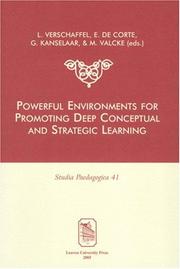
ISBN: 905867469X Year: 2005 Volume: 41 Publisher: Leuven Leuven University Press
Abstract | Keywords | Export | Availability | Bookmark
 Loading...
Loading...Choose an application
- Reference Manager
- EndNote
- RefWorks (Direct export to RefWorks)
Didactic strategies --- Opvoedkunde --- Pédagogie --- Academic collection --- 371.3 --- Didaktiek. Onderwijsmethoden. Evaluatie van het lesgeven --- Classroom environment. --- Computer-assisted instruction. --- Concept learning. --- Learning, Psychology of. --- Learning. --- Mathematics --- Lerarenopleiding --- Study and teaching. --- algemeen --- algemeen. --- 371.3 Didaktiek. Onderwijsmethoden. Evaluatie van het lesgeven --- Algemeen. --- Classroom environment --- Computer-assisted instruction --- Concept learning --- Learning --- Learning, Psychology of --- Psychology of learning --- Educational psychology --- Comprehension --- Learning ability --- Learning process --- Education --- CAI (Computer-assisted instruction) --- Computer-aided instruction --- Computer-assisted learning --- Computer based instruction --- Computer-enhanced learning --- Electronic data processing in programmed instruction --- ILSs (Integrated learning systems) --- Integrated learning systems --- Microcomputer-aided instruction --- Microcomputer-assisted instruction --- Microcomputer-assisted learning --- Microcomputer-based instruction --- Teaching --- Educational technology --- Programmed instruction --- Telematics --- Classroom climate --- Climate, Classroom --- Environment, Classroom --- Classroom management --- Educational sociology --- School environment --- Teacher-student relationships --- Study and teaching --- Psychological aspects --- Data processing
Book
ISBN: 9289604107 Year: 2005 Volume: 116 Publisher: Luxembourg EUR-OP
Abstract | Keywords | Export | Availability | Bookmark
 Loading...
Loading...Choose an application
- Reference Manager
- EndNote
- RefWorks (Direct export to RefWorks)
Adult education. Lifelong learning --- Computer architecture. Operating systems --- Europe --- Education --- Internet in education --- Computer-assisted instruction --- Internet en éducation --- Enseignement assisté par ordinateur --- Computer network resources --- Information électronique --- Internet en éducation --- Enseignement assisté par ordinateur --- Information électronique --- Web-based instruction --- Online instruction, Web-based --- Online teaching --- Web-based online instruction --- Internet (Computer network) in education --- CAI (Computer-assisted instruction) --- Computer-aided instruction --- Computer-assisted learning --- Computer based instruction --- Computer-enhanced learning --- Electronic data processing in programmed instruction --- ILSs (Integrated learning systems) --- Integrated learning systems --- Microcomputer-aided instruction --- Microcomputer-assisted instruction --- Microcomputer-assisted learning --- Microcomputer-based instruction --- Teaching --- Educational technology --- Programmed instruction --- Telematics --- Data processing --- Courses, Online --- Online courses --- Online education --- Distance education
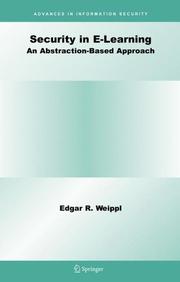
ISBN: 1280263377 9786610263370 038726065X 0387243410 1441937226 Year: 2005 Publisher: New York, NY : Springer,
Abstract | Keywords | Export | Availability | Bookmark
 Loading...
Loading...Choose an application
- Reference Manager
- EndNote
- RefWorks (Direct export to RefWorks)
Security in E-Learning is organized in three parts. First, the author raises awareness that security is an important issue in the context of education. The second part of the book emphasizes that security is mainly an organizational and management issue. The third goal highlights improving security as an ongoing process. Security in E-Learning includes technical fundamentals (buzz words), examples and case studies covering each of these three topics. Considering the enormous costs of creating and maintaining courses, it is surprising that security is not yet considered an important issue by professionals, professors and students. Traditional security research has been largely driven by military requirements to enforce secrecy in the realm of e-learning. In most cases, the knowledge contained in e-learning programs is widely available. Therefore, the asset is not the information itself, but the hypermedia presentation used to convey the information. Security in E-Learning is designed for a professional audience composed of researchers and practitioners in industry and IT professionals. This volume is also suitable for upper undergraduate-level and graduate-level students in computer science.
Information technology --- Computer security --- Computer-assisted instruction --- Management. --- Security measures. --- Computer science. --- Software engineering. --- Computer programming. --- Data structures (Computer science). --- Data encryption (Computer science). --- Computer Science. --- Data Structures, Cryptology and Information Theory. --- Information Systems Applications (incl. Internet). --- Data Encryption. --- Software Engineering/Programming and Operating Systems. --- Programming Techniques. --- Software Engineering. --- Data encoding (Computer science) --- Encryption of data (Computer science) --- Cryptography --- Information structures (Computer science) --- Structures, Data (Computer science) --- Structures, Information (Computer science) --- Electronic data processing --- File organization (Computer science) --- Abstract data types (Computer science) --- Computers --- Electronic computer programming --- Electronic digital computers --- Programming (Electronic computers) --- Coding theory --- Computer software engineering --- Engineering --- Informatics --- Science --- Programming --- CAI (Computer-assisted instruction) --- Computer-aided instruction --- Computer-assisted learning --- Computer based instruction --- Computer-enhanced learning --- Electronic data processing in programmed instruction --- ILSs (Integrated learning systems) --- Integrated learning systems --- Microcomputer-aided instruction --- Microcomputer-assisted instruction --- Microcomputer-assisted learning --- Microcomputer-based instruction --- Teaching --- Education --- Educational technology --- Programmed instruction --- Telematics --- Data processing --- Data structures (Computer scienc. --- Data Structures and Information Theory. --- Cryptology. --- Application software. --- Application computer programs --- Application computer software --- Applications software --- Apps (Computer software) --- Computer software
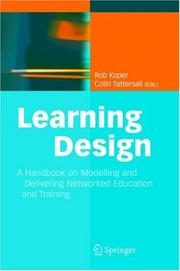
ISBN: 1280412844 9786610412846 3540273603 3540228144 3642061621 Year: 2005 Publisher: Berlin ; New York : Springer,
Abstract | Keywords | Export | Availability | Bookmark
 Loading...
Loading...Choose an application
- Reference Manager
- EndNote
- RefWorks (Direct export to RefWorks)
E-learning is still in its infancy. This can be seen both in the limited pedagogical quality and lack of portability of e-learning content, and in the lack of user-friendly tools to exploit the opportunities offered by current technologies. To be successful, e-learning must offer effective and attractive courses and programmes to learners, while at the same time providing a pleasant and effective work environment for staff members who have the task to develop course materials, plan the learning processes, provide tutoring, and assess performance. To overcome these deficiencies, the IMS Global Learning Consortium Inc. released the Learning Design Specification in 2003. With Learning Design it is possible to develop and present advanced, interoperable e-learning courses embracing educational role and game playing methods, problem-based learning, learning community approaches, adaptivity and peer coaching and assessment methods. In this handbook Koper and Tattersall have put together contributions from members of the "Valkenburg Group", consisting of 33 experts deeply involved in e-learning and more specifically learning design. The result is a rich and lasting source of information for both e-learning course and tool developers, providing information about the specification itself, how to implement it in practice, what tools to use, and what pitfalls to avoid. The book not only reports first experiences, but also goes beyond the current state of the art by looking at future prospects and emerging applications.
Internet in education. --- Education --- Computer-assisted instruction. --- Computer network resources. --- CAI (Computer-assisted instruction) --- Computer-aided instruction --- Computer-assisted learning --- Computer based instruction --- Computer-enhanced learning --- Electronic data processing in programmed instruction --- ILSs (Integrated learning systems) --- Integrated learning systems --- Microcomputer-aided instruction --- Microcomputer-assisted instruction --- Microcomputer-assisted learning --- Microcomputer-based instruction --- Teaching --- Educational technology --- Programmed instruction --- Telematics --- Internet (Computer network) in education --- Data processing --- Information theory. --- Education. --- Software engineering. --- Computer science. --- Theory of Computation. --- Computers and Education. --- Educational Technology. --- Information Systems Applications (incl. Internet). --- Software Engineering. --- User Interfaces and Human Computer Interaction. --- Informatics --- Science --- Computer software engineering --- Engineering --- Children --- Education, Primitive --- Education of children --- Human resource development --- Instruction --- Pedagogy --- Schooling --- Students --- Youth --- Civilization --- Learning and scholarship --- Mental discipline --- Schools --- Training --- Communication theory --- Communication --- Cybernetics --- Computers. --- Education—Data processing. --- Educational technology. --- Application software. --- User interfaces (Computer systems). --- Interfaces, User (Computer systems) --- Human-machine systems --- Human-computer interaction --- Application computer programs --- Application computer software --- Applications software --- Apps (Computer software) --- Computer software --- Instructional technology --- Technology in education --- Technology --- Educational innovations --- Instructional systems --- Automatic computers --- Automatic data processors --- Computer hardware --- Computing machines (Computers) --- Electronic brains --- Electronic calculating-machines --- Electronic computers --- Hardware, Computer --- Computer systems --- Machine theory --- Calculators --- Cyberspace --- Aids and devices
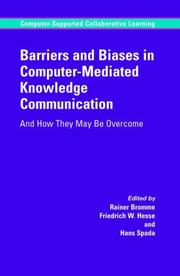
ISBN: 0387243178 144193720X 9786610263363 1280263369 0387243194 Year: 2005 Volume: v. 5 Publisher: New York, NY : Springer,
Abstract | Keywords | Export | Availability | Bookmark
 Loading...
Loading...Choose an application
- Reference Manager
- EndNote
- RefWorks (Direct export to RefWorks)
This books deals with computer-mediated cooperation and communication scenarios in teaching and learning situations, leisure activities (e.g. laypersons looking for expert information on the internet), and net-based communication at work. Such scenarios will become increasingly important. But the successful use of such computer-mediated settings is not trivial. Cooperative learning and work itself requires special skills and strategies. And the technical settings with sometimes restricted, sometimes new possibilities for communication add problems on top of the cooperation itself. What are the barriers in computer-mediated communication for cooperative learning and work? Which are the most relevant biases in computer-mediated information processing? Based on empirical research the contributors from psychology, education and computer sciences offer different perspectives on the nature and causes of such barriers. The chapters also give an answer to the question how it might be possible to overcome these barriers and biases to fully gain advantage from the new technical opportunities. These results and answers are of interest for students as well as for researchers in all fields related to the use and evaluation of computer software in communication settings.
Computer-assisted instruction. --- Knowledge acquisition (Expert systems) --- Enseignement assisté par ordinateur --- Acquisition des connaissances (Systèmes experts) --- Computer-assisted instruction --- Education --- Social Sciences --- Education, Special Topics --- Theory & Practice of Education --- Enseignement assisté par ordinateur --- Acquisition des connaissances (Systèmes experts) --- EPUB-LIV-FT LIVEDUCA SPRINGER-B --- Acquisition, Knowledge (Expert systems) --- Expertise acquisition (Expert systems) --- CAI (Computer-assisted instruction) --- Computer-aided instruction --- Computer-assisted learning --- Computer based instruction --- Computer-enhanced learning --- Electronic data processing in programmed instruction --- ILSs (Integrated learning systems) --- Integrated learning systems --- Microcomputer-aided instruction --- Microcomputer-assisted instruction --- Microcomputer-assisted learning --- Microcomputer-based instruction --- Teaching --- Data processing --- Education. --- User interfaces (Computer systems). --- Educational technology. --- Personality. --- Social psychology. --- Educational Technology. --- User Interfaces and Human Computer Interaction. --- Education, general. --- Learning & Instruction. --- Personality and Social Psychology. --- Expert systems (Computer science) --- Educational technology --- Programmed instruction --- Telematics --- Computer science. --- Consciousness. --- Apperception --- Mind and body --- Perception --- Philosophy --- Psychology --- Spirit --- Self --- Informatics --- Science --- Children --- Education, Primitive --- Education of children --- Human resource development --- Instruction --- Pedagogy --- Schooling --- Students --- Youth --- Civilization --- Learning and scholarship --- Mental discipline --- Schools --- Training --- Learning. --- Instruction. --- Mass psychology --- Psychology, Social --- Human ecology --- Social groups --- Sociology --- Personal identity --- Personality psychology --- Personality theory --- Personality traits --- Personology --- Traits, Personality --- Individuality --- Persons --- Temperament --- Learning process --- Comprehension --- Interfaces, User (Computer systems) --- Human-machine systems --- Human-computer interaction --- Instructional technology --- Technology in education --- Technology --- Educational innovations --- Instructional systems --- Aids and devices
| Listing 1 - 10 of 10 |
Sort by
|

 Search
Search Feedback
Feedback About UniCat
About UniCat  Help
Help News
News